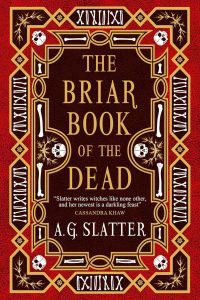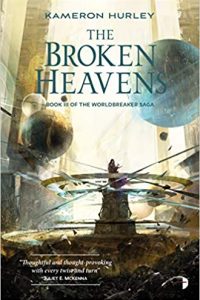Colleen Mondor Reviews We Ride Upon Sticks by Quan Barry
 We Ride Upon Sticks, Quan Barry (Pantheon Books 978-1-5247-4809-8, $26.95, 360pp, hc) March 2020.
We Ride Upon Sticks, Quan Barry (Pantheon Books 978-1-5247-4809-8, $26.95, 360pp, hc) March 2020.
Prior to Quan Barry’s We Ride Upon Sticks, I had never read a novel about a field hockey team. In retrospect, it is a perfectly tailored sport for a story about witchcraft – teenage girls (plus one boy) who really, really want to win while running around on a field wielding sticks at their opponents. When you throw in a potent setting, in this case the town of Danvers MA that was home to the original Salem accusers (also teenage girls), then you start to wonder why in the world no one has ever written before about a field hockey team that falls for magical temptation. Happily, Barry, who was raised in Danvers, is perfectly poised to dig deep into her hometown’s past while also reveling in all the opportunities presented by a complicated group of teenagers pursuing one goal while trying not to go too far in the process. Basically, We Ride Upon Sticks is the sort of glorious drama-filled fun that any teen could want to lose themselves in and a most excellent diversion for the waning days of the truly bitter and brutal year that is 2020.
It all begins at camp, as these things often do, with the Danvers Falcons getting their butts kicked yet again. In frustration, goalie Mel Boucher draws upon some of the witchcraft history she learned from a recent library discovery and crafts a spell in her notebook (with Emilio Estevez on the cover, as it is 1989 and Emilio is quite popular). One by one her ten teammates get onboard with the spell and the team starts winning. Once school starts and the season takes off in earnest, they find themselves having to do a bit more with each passing week to satisfy “Emilio’s” demands. Mel is convinced that the spell is the way to go, while a few of the others are not entirely sure. What they all agree on is that they don’t want to stop winning, and so they look for ways to be better witches and that means getting into (or at least thinking about) trouble.
One of the best things about We Ride Upon Sticks (which is a line from the actual testimony of Tituba, the first Salem woman to be accused in 1692), is how Barry manages to balance the stories of 11 different characters in unique and specific ways. The team members wrestle with all manner of problems, from sex to race to gender identity, while also trying to fit in or, even better, embrace the courage to defiantly not fit in. They have parents, teachers, and coaches to contend with (in some very complicated ways) while also trying to keep a certain sneaky school reporter at arm’s length (she is determined to make their miraculous season the story that brings her personal success). All the while, Barry weaves just enough local history into the plot to make the witchcraft and its attendant pressures believable. How could the Danvers Falcons be winning if not for the notebook spell? And, like the original Salem accusers, can they stop what they started if it all becomes impossible to control?
We Ride Upon Sticks is not technically a young-adult novel, but with a full cast of teen characters and high school setting it’s impossible not to see this as a hit for older teens. The final chapter jumps ahead in time to let everyone see how things turn out, a welcome touch when readers will have so much invested in their favorite characters. (For me personally that was Mel, who is French Canadian and curses in the very particular Quebecois which is familiar to those of us with similar New England roots.) Barry is a talent at taking a small story, making it big, and not letting the magic get in the way of the characters. This novel is a dark and complex delight, something to savor as winter winds blow at your door.
Colleen Mondor, Contributing Editor, is a writer, historian, and reviewer who co-owns an aircraft leasing company with her husband. She is the author of “The Map of My Dead Pilots: The Dangerous Game of Flying in Alaska” and reviews regularly for the ALA’s Booklist. Currently at work on a book about the 1932 Mt. McKinley Cosmic Ray Expedition, she and her family reside in the Pacific Northwest and Alaska. More info can be found on her website: www.colleenmondor.com.
This review and more like it in the October 2020 issue of Locus.
 While you are here, please take a moment to support Locus with a one-time or recurring donation. We rely on reader donations to keep the magazine and site going, and would like to keep the site paywall free, but WE NEED YOUR FINANCIAL SUPPORT to continue quality coverage of the science fiction and fantasy field.
While you are here, please take a moment to support Locus with a one-time or recurring donation. We rely on reader donations to keep the magazine and site going, and would like to keep the site paywall free, but WE NEED YOUR FINANCIAL SUPPORT to continue quality coverage of the science fiction and fantasy field.
©Locus Magazine. Copyrighted material may not be republished without permission of LSFF.








